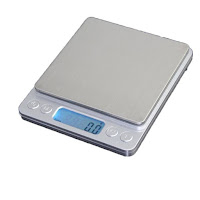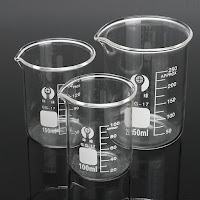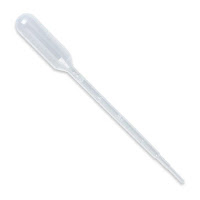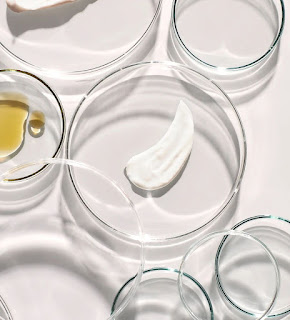Essential tools for every formulator
Hi hi formulator
Do you know that you can get right ahead into product formulation and make your first pretty skincare products at home with just a small cosmetic formulation kit of essential tools? Most of which you will either already have at home or can source cheaply and easily online.
Here are top essential tools you need to get started on your formulation journey
1) Digital Measuring Scale
At SSK Beauty School, we write and measure out formulations in Weight (grams) and never in fluid ounces or millilitres. This is best practice in cosmetic formulation as otherwise you have only a vague formulation to work with. For example, an emulsifier of wax pellets would have pockets of air between the flakes so could never be measured out using liquid graduations on a beaker.
When you start out formulating and are making small trial amounts of product all you need is a small digital scale which operates to two decimal points: from 0.01g going up to 500gms. These digital scales are affordable (around NGN 10,000/$10 to NGN 15,000/ $15) and easy to find online in stores like B2rlab, Sophix natural and Amazon. Later on, if you need to scale up cosmetic manufacture, you will need scales that weigh out larger batches in several kilos or pounds.
2) Glass beakers
The second piece of equipment in your cosmetic formulation kit is a small range of glass beakers which are available online from the online stores I mentioned previously. I love glass beakers because using them will make you feel like a natural formulator. They represent your new interest and are the beginnings of your home lab.
Start small and invest in a few 50ml ,100ml, 250ml and 500ml beakers to start with as these are suitable sizes for trial batches and experimenting. Some tinier ones around 10 or 20ml are useful for very small amounts of ingredients, such as essential oil blends or weighing out preservatives.
3) Thermometer
A thermometer is essential to take formulation beyond simple cold-blended cosmetics. At some point, you will want to explore emulsion making to create luxurious skin-feel creams, lotions and serums. There are several types of thermometer to choose from; I recommend using an infrared thermometer.
4) Glass rods
Glass rods are the mainstay of formulating so grab a 10-piece pack of them now. They are so cheap and usually come in packs anyway. Glass is easy to clean and is the most hygienic option along with stainless steel spoons. Long-handled stainless steel spoons are ideal for handling dry, powdered and more viscous liquid ingredients when weighing out your formula.
5) Homogeniser (Handheld Stick blender)
A homogeniser is a useful tool as it can speed up blending, especially emulsion making. While there are large, heavy, lab-bench homogenisers that market for hundreds of dollars, all you need is a cheap, mini, hand-held version. You can also use frothers for this purpose but just note that frothers have a different head and may incorporate too much air into your emulsions unless you keep the frother well down in your formulation.
6) Mini whisk
Mini whisks are simple, everyday kitchen items that are also indispensable in home formulation. Buy a few and keep them separate from your kitchen utensils. They come in very handy for blending liquids and you will need them for emulsion making when you homogenise the oil and water phases.
7) pH meter or strips
Any formulation that contains water will have a pH and one of the first things you learn as a beginner formulator is that water-containing cosmetics like emulsions should be within the skin-friendly pH range of 4.5-5.5. The skin is naturally slightly acidic. Some ingredients, such as Alpha Arbutin, Niacinamide, Sepi white etc formulations are designed to work in a certain pH range. Therefore, to measure the pH of your formulations, you need either pH strips or a pH meter. Paper strips which come with a colour chart to guide you are the cheapest option and perfectly fine to use as a beginner formulator. When it comes to upgrading, there are a lot of pH meters on the market. I advise that you understand the principles of pH more fully before investing in more complex equipment which will need maintenance. First, you need to know how to adjust the pH of your products using an alkaline base such as L-Arginine to increase pH, or an acid like lactic acid to lower pH. Our Diploma in Natural Skincare Formulation Course covers pH in depth.
8) Pipettes
You will need pipettes to measure out small amounts of liquid ingredients, especially essential oils and any preservatives which are used at one percent or so. Pipettes come in single-use plastic form or in glass. At SSK Beauty School, we recommend and prefer glass pipettes as they can be re-used but you can get a pack of plastic pipettes for a start
9) Stainless steel bowls
To heat butters, oils and waxes for simple anhydrous blends, and the oil and water phases in emulsions, you need heat-proof pans and bowls to create a double boiler method. Stainless steel and glass are easier to sanitise and keep hygienic. Ensure you use heatproof pads to handle any hot bowls; silicon is an ideal material to use to protect surfaces and hands.
10) Formulators Lab notebook
As a formulator, It is super important to keep notes. Not only when you are learning cosmetic formulation but throughout your career as a formulator. You need to not only write down the formula itself, but also every stage in manufacture, every change you made or changes to the product over time, and everything you observe about your formulation trials. So invest into getting a formula lab notebook and get into the habit of writing everything about your formulations down. This is a good habit to adopt and will set you up for learning about GMP which is required if you go on to make and sell your skincare products. The Formulators Bestie Lab notebook developed by SSK Beauty School will be made available for preorder soon. Join the waitlist now!
11) 70% IPA Sanitiser
Wherever you are learning and whatever equipment you use in your cosmetic formulation kit, you need to sanitise your working space counter top and tools before starting to formulate. This is as simple as filling a clean, new spray bottle with Isopropyl alcohol, spraying your working areas and tools and leaving them to dry. I advise using 70 percent Isopropyl alcohol as higher percentages evaporate too quickly to sanitise surfaces properly. If you can find only 99 percent proof, then simply dilute it 70:30 with pure water.
12) Handheld Mixer
A handmixer is essential if you are starting out with making anhydrous products like body butters which would need whipping before pipping. You can invest in a hand held mixer before upscaling to a table top mixer with a rotating bowl. Hand mixer could be gotten within the price range of NGN 10,000/$10 to NGN 15,000/$15
13) Spatula
Investing in silicon spatula would make your formulation journey very easy. A silicon spatula helps to mix in products very well and also to scoop them out. They are very durable and strong. You can buy a set of 5 or you can buy in singles. Ensure to wash your spatulas after use. As they may tend to attract stains if kept for a longer period of time without washing
Supplier contacts (direct links)
Leave us a comment if you find this post helpful. Also you can drop a comment on the topic you’d like to see next on our blog


















Comments
Post a Comment